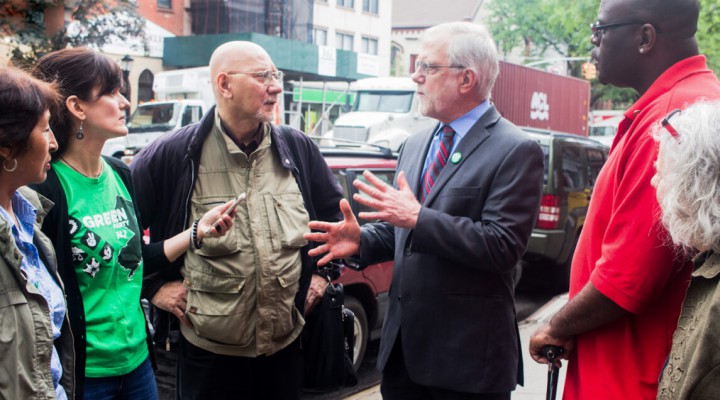No, You Don’t Have To Vote for Trump or Biden. Here Are a Few Third-Party Candidates and How They’ve Been Censored

“The lesser evil paves the way to the greater evil. It’s not in opposition to it. It makes way for it.” — Former Green Party Presidential Candidate Jill Stein
Democrats Campaigning to Keep Green Party off the Ballot in Key Swing States
Earlier this year, Green Party vice-president Walker was alleged to have filled out a change of address form slightly incorrectly for her South Carolina residence. As a result, Democrats used this to lead a campaign to remove her name from ballot papers in the battleground states of Pennsylvania and Wisconsin.
Third parties have also been undermined by a lack of media publicity, their actions barely reported on. As such, they have been forced to rely on social media for outreach. However, that has not been plain sailing. Hawkins was even (temporarily) kicked off Twitter for alleged impersonation. “How do I impersonate myself? Twitter’s explanation for its censorship makes no sense,” he responded.
Pros and cons of third-party voting
Of course, barring an act of God or a disaster, either Trump or Biden will become the next president, meaning that the principal choice is between these two men. Does it, therefore, follow that voting third party is a wasted vote?
Certainly, there are differences between the two main candidates, particularly on climate change, that could have profound effects on both the United States and the world going forward. While Trump charges forward, claiming that global warming is a Chinese “hoax,” Biden at least acknowledges there is an existential problem that must be met, and has been forced into adopting a more radical platform on the issue. This alone, for many, is enough to pick Biden.
“A vote for the Green Party is a vote for fascism,” claim some Democrats, arguing that by picking a third party, they are enabling Trump.
Should Third Parties Support ‘Vote Pacts’ To Avoid ‘Spoiling’ Elections?
However, the reality of the democratic system is that most people’s presidential votes count for very little. Politico calculated that the election will be decided by voters in just eight battleground states: Arizona, Florida, Georgia, Michigan, Minnesota, North Carolina, Pennsylvania, and Wisconsin. Because of the electoral college system, most Americans live in states where the outcome has been largely predetermined.
Others see the choice as a philosophical one, preferring to vote for something they want and lose than for something they don’t want and win. “The two-party system only provides an illusion of choice. The Democratic Party and Republican Party are two variations of a single, war-driven, Wall Street-funded political party,” wrote MintPress’ Mnar Muhawesh in 2016, endorsing Jill Stein of the Green Party for president. Stein herself also noted that constantly picking the lesser of two evils gets you nowhere. “The lesser evil paves the way to the greater evil. It’s not in opposition to it. It makes way for it,” she said, “I feel most horrible about a voting system that says: Here are two deadly choices, now pick your weapon of self-destruction.”
Proponents of third parties argue that it keeps the two major parties in check and scared voters could desert them. Historically, the arrival of powerful third parties has shaken up the political system and led to progressive change. Abraham Lincoln and the Republicans, after all, were a third party campaigning against the institution of slavery. Since at least 2008, when Barack Obama campaigned on it, Americans have been crying out for hope and change, but have received very little of it.
Others claim that they artificially swing the election towards one candidate. The Green’s Ralph Nader is often accused of handing the 2000 election to George W. Bush, his 2.9 million votes undermining Al Gore’s shot at the White House (this theory is hotly disputed). Eight years before that, billionaire Ross Perot received 19% of the total vote.
Undermining election integrity
However, the bigger threat to election integrity this year is surely voter suppression shenanigans. Earlier this year, Trump let slip that he believed no Republican would ever be elected if turnout was high. Since then, he appears to have been on a campaign to decrease participation.
Hundreds of mail sorting machines have been removed from post offices and sorting houses. Since 2013, almost 1,700 polling stations across the South have also been closed down, primarily in poorer, darker neighborhoods. As a result, millions will have to stand in line for hours in the middle of a pandemic. Trump and the Republicans have also attacked the process of postal voting and ballot collection, with the president encouraging his supporters to “protect” polling stations. As a result, only two-thirds of Americans are confident that Election Day will proceed democratically.
Across the country, organizations and businesses are preparing for violence. In New York City, hotels and stores are boarding up their windows, as if they expect a riot. Meanwhile, officials have ordered the immediate construction of a non-scaleable fence around the White House.
Regardless of whether you will opt for one of the major parties or choose an alternative one, there will likely be a good number of down ballot races and initiatives that will be worth deciding between. The great anarchist activist Emma Goldman is thought to have said that if voting changed anything, they’d make it illegal. The lengths the establishment goes to dissuade the public from doing so suggest that it does indeed still matter.
Feature photo | Green Party Candidate Howie Hawkins is pictured speaking to voters. Photo | Hawkins Campaign
 TheAltWorld
TheAltWorld 
0 thoughts on “No, You Don’t Have To Vote for Trump or Biden. Here Are a Few Third-Party Candidates and How They’ve Been Censored”